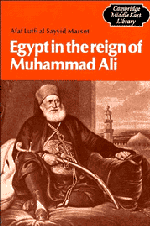Book contents
- Frontmatter
- Contents
- Dedication
- Preface
- Note on transliteration
- 1 Egypt under the mamluks
- 2 Muhammad Ali the man
- 3 A country without a master
- 4 Master in his own house
- 5 Family, friends and relations
- 6 Internal policies
- 7 Agricultural changes
- 8 Industry and commerce
- 9 Expansion to what end?
- 10 The undoing: Muhammad Ali and Palmerston
- 11 The aftermath
- 12 Conclusion
- Notes
- Glossary of Arabic and Turkish terms
- Select bibliography
- Index
3 - A country without a master
Published online by Cambridge University Press: 04 April 2011
- Frontmatter
- Contents
- Dedication
- Preface
- Note on transliteration
- 1 Egypt under the mamluks
- 2 Muhammad Ali the man
- 3 A country without a master
- 4 Master in his own house
- 5 Family, friends and relations
- 6 Internal policies
- 7 Agricultural changes
- 8 Industry and commerce
- 9 Expansion to what end?
- 10 The undoing: Muhammad Ali and Palmerston
- 11 The aftermath
- 12 Conclusion
- Notes
- Glossary of Arabic and Turkish terms
- Select bibliography
- Index
Summary
The Anglo-Ottoman forces landed in Egypt on 8 March 1801. Three months later, on 27 June, Cairo fell and the French forces evacuated the city a week later. The minute the Ottoman forces entered Cairo the soldiers rushed to the aswaq and placed their arms and colours on coffee-houses, shops and bath houses. Such actions did not reassure the owners of these establishments, who realized that the soldiers meant to share in their profits. Next the Turks and the Albanians took to trading. They went outside the city to meet the fallahin bringing in their supplies for sale, bought all the produce at a low price, which the fallahin were too scared to refuse, and then brought it into the city and resold it to the city merchants at a great profit.
By then the Ottoman forces were clearly split into two factions, Albanians and Turks, neither of which obeyed its superior officers. Likewise the mamluks were split into two factions, one under Alfi Bey, the enfant terrible, and the other nominally led by Ibrahim Bey who, with age, had turned over the command to Uthman Bey Bardissi. At first the mamluks cooperated with the Ottoman forces and were led to believe that they would be restored to their former functions and positions of influence within the land.
- Type
- Chapter
- Information
- Egypt in the Reign of Muhammad Ali , pp. 36 - 59Publisher: Cambridge University PressPrint publication year: 1984

